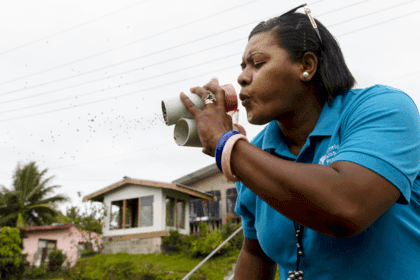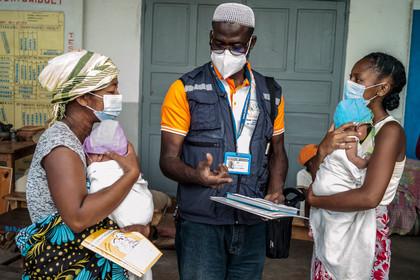
Wellcome’s strategy for taking on infectious diseases is rooted in the realities of the modern world.
People are more interconnected than ever before. International trade and travel are rebounding, cities are growing rapidly, the link between climate and health is increasingly evident, and our interactions with disease vectors and animal populations continue to rise.
These are the hallmarks of the 21st century. But they are putting us at increased risk of infectious diseases.
Wellcome has always supported a broad range of curiosity-driven infectious disease research, from exploring the fundamental processes that underpin biology, to developing new methodologies, clinical research, and the social, political and cultural contexts of disease.
This continues through our Discovery Research funding schemes, which will yield new insights and tools to help respond to endemic and epidemic infections in the future.
But we are also determined to forge a new approach through the Infectious Disease programme I am leading.
A new way forward
Rather than firefighting, we want to develop better methods to prevent and limit the escalation of infectious diseases before they spiral out of control and become entrenched in communities.
This is a relatively new focus for the field. I’ve heard this loud and clear when speaking to researchers and academics who want to know more about why we have chosen this direction for our Infectious Disease programme.
Imagine if we had been able to stop the escalation of tuberculosis or malaria before they spun out of control hundreds of thousands of years ago and entrenched a burden of death and disease that continues to this day.
To get ahead of outbreaks in future, we’ll be funding research teams to investigate the sources and drivers of infections.
What are the reservoirs where pathogens originate and move into humans? What makes some pathogens more likely to spill over and thrive? How do these reservoirs interact with people, our environment and tools such as vaccines and treatments?
And what about the drivers that promote disease escalation? We know that the overuse of antibiotics is one of them and anticipate that climate and environmental disruption will also contribute.
But this is only part of the equation. If we know which diseases or potential pathogens are likely to escalate, we need to ensure that we have an affordable and accessible portfolio of products, interventions and tools to stop them.
"Rather than firefighting, we want to develop better methods to prevent and limit the escalation of infectious diseases before they spiral out of control and become entrenched in communities."
Putting equitable access at the heart of our programme
Take Covid. Although the first generation of vaccines work well for higher-income countries, costs, cold-chain requirements and the need for more than one shot make them less useful in lower- and middle-income countries. Many regions of the world also currently lack the capability and capacity to make vaccines themselves.
Wellcome’s Infectious Disease programme will be supporting the research and development of products and interventions that are better targeted to the needs of those most impacted by infectious diseases.
This could be mucosal vaccines that limit transmission, innovations that reduce the price of monoclonal antibodies, or expanding insect vector control programmes to target more pathogens, for example.
Through our funding to Hilleman Laboratories in Singapore, we’re already supporting the development of a low-cost oral vaccine for cholera, better tailored to meet the needs of the communities most affected. And we’re also supporting CEPI, GHIT and CARB-X to advance other new and affordable interventions.
To deliver these life-saving tools as soon as possible, we continue to support the wider adoption of human infection studies to gain an earlier indication of whether a new vaccine or treatment might work. We will also be funding new research into correlates of protection, such as antibodies and T-cells, with the hope of identifying these markers sooner in order to accelerate clinical trials.
Working across disciplines and sectors
But research and development alone can’t prevent the future escalation of infectious diseases. We will only succeed if we convince others to join us on this journey.
We’ll be building this case through our communications and advocacy work, encouraging governments and industry to invest for the long term in scaling up research, development and manufacturing to rapidly deliver affordable interventions to those most at risk.
And we’ll keep supporting, talking and working with researchers who believe, as I do, that we’re at a turning point in humanity’s relationship with infectious diseases. Researchers who can see a world in which science is used more and more to prevent infections from becoming threats to our health in the first place.
We’re funding research to better understand what causes and drives infectious diseases to escalate and the solutions to control their impact.
There are currently no open funding opportunities for Infectious Disease. Learn more about the funding we provide.


